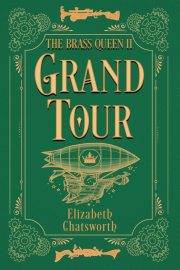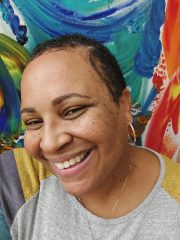Yes, We Need Diverse Books, But We Also Need Diverse Reviewers–Still*
by Erika Hardison
This essay is the fourth of eight in the Publishing Taught Me: A SFWA Anthology Project.
Ever since Black YA Fantasy author L.L. McKinney set Twitter (now known as X) ablaze with her hashtag #PublishingPaidMe in 2021, the traditional publishing industry has been scrambling to give the appearance that they are truly committed to being more inclusive. While the public was becoming aware of how nonwhite authors were being treated, the industry itself continues to struggle with its blind spots when it comes to hiring and cultivating its nonwhite peers. In a New York Times piece that was published earlier this year, Black publishing professionals expressed their opinions on their colleagues who made public promises of change. Erroll McDonald, a publishing industry vet with over forty years of experience and current vice president and executive editor at Knopf, stated that he doesn’t see enough change to make an impact in the near future.
Recently, Lee & Low, a “blog on race, diversity, education, and children’s books,” reported that the book industry had a diversity boost of roughly 7% across the industry. Even though some growth is better than nothing, can the publishing industry afford to be this slow with progress?
The answer is no.
With book bans on the rise and an uptick of racist, unhinged authors, and bad actors targeting nonwhite authors and review-bombing them, more diverse reviewers must be recruited and supported to counter the anti-intellectualism that is currently plaguing Western pop culture. If this issue isn’t addressed with urgency, other markets outside of the West will mimic these practices as the standard. But there are many systemic hurdles that prevent positive change from happening. One of the issues McKinney highlighted was the pay discrepancies between Black and white authors. Unfortunately, that issue isn’t just limited to them. Book industry jobs tend to pay on the lower side of media jobs. Many blame misogyny and sexism for that. Although white women overwhelmingly dominate the traditional publishing industry, men occupy most of the senior executive positions and are paid more than their women peers.
In 2019, former Penguin Random House editor Bethany Patch penned a transparent essay in The Guardian on the then-current hurdles that publishing workers were living with. One of the issues raised by Patch was that the salary doesn’t support the employees who live in hot markets like New York City. Let’s not forget that HarperCollins employees recently went on a strike just to ensure they can guarantee a minimum $50,000 yearly salary. And with Lee & Low confirming the data it collected, how does the publishing industry expect to attract and retain talent if they are excluding people from economically vulnerable backgrounds, which can disproportionately impact people of color?
Nonwhite authors face a multitude of challenges if they wish to succeed in the book industry. Publishers that remain lax with their lack of diversity media outreach continue to fail these diverse authors despite pledging to do better. With diverse authors, especially debut authors with upcoming releases, it is important for publishers not to half-step their process. It’s equally important that white book editors seek out diverse reviewers and critics to commission reviews that require cultural competence and first-person experiences.
As a professional book reviewer who identifies as Black, I go above and beyond to review, sell, and recommend diverse books almost exclusively. Between highlighting Black and POC graphic novels and comics every month with Sistah SciFi, to being Steph Curry’s former book curator for his Literati book club, I realized how critical it is to have someone advocate for diverse literature and ensure marginalized authors’ books can reach the masses while being supported by influential people. Outside of book editors and reviewers, readers, fandoms, and celebrities can also push underrated, diverse books and make mainstream media pay attention. But despite those efforts, there still aren’t enough mainstream outlets that regularly highlight authors of color extensively and consistently.
So what can the publishing industry do now? Jason Low, one of the co-owners of the Lee & Low blog, shared a more optimistic opinion on the future of book publishing and its diversity issue with the New York Times. “We are consistently moving in the right direction, maybe not as quickly as we’d like,” and “I’m actually quite pleased and hopeful.” But how does that help nonwhite authors in the present? Efforts to ban their books are happening today and authors cannot wait five or ten years for the book industry to progress just a minuscule amount to the left to support them openly and unapologetically.
Publishing marketers and publicists need to revamp their communication efforts and diversify their outreach list with rising nonwhite influencers, scholars, journalists and content creators. While industry professionals are studying TikTok and using it as the barometer for what (white) readers want to consume, (the hashtag #BookTok has over 30 million posts) several diverse voices are emerging through the sea of whiteness to champion diverse books.
Users such as @conjuringliteracy, @Neekstok, @Michael.LaBorn, @TheBlerdLibrary, @KrishanaDavis, @LocdBooktician, @mousetache_reads, @readwithneleh, @paperbacks_and_frybread, @iamcaseyrkelley, and @mynameismarines continue to create engaging, bookish content while highlighting diverse books, including science fiction and fantasy which doesn’t always get highlighted in media unless it falls under children’s fiction. Being a book influencer is often a labor that is done for free, despite white book influencers being compensated for the same type of content. For once, I’d like to see one of these nonwhite bookish creators supported by big publishers for paid media campaigns. Nonwhite authors deserve spots on bookstore chain stores’ “TikTok” tables as well.
However, let’s not forget about the art and culture writers, journalists and scholars who also advocate for diverse books. While they aren’t influencers, they continue to positively contribute overlooked books and authors with their sharp analysis of literary subjects and pop culture. Journalists like Starr Rocque, Jolie Doggett, Arianna Rebolini, and Keyaira Boone are a few professional writers who actively review and profile books written by diverse authors. Scholars such as Dr. Stephanie R. Toliver have created the Reading Black Futures website as an ongoing list of Black science fiction and fantasy young adult and middle-grade titles for the public. Even if you don’t read children’s lit, you must admit this type of dedication can do the public a greater good.
Diverse bookstores and librarians are also making themselves stand out by partnering with content creators and picking up the slack for what publishers should be doing for their marginalized authors and projects. Bookstores and library workers are finding ways to create a community with authors and readers while selling books on- and offline. It’s quite impressive how bookstores and library workers have found innovative ways to create third places online by finding people who want to decolonize their bookshelves. It makes you wonder: if independent bookstores and local librarians can do this, why can’t the publishing industry do the same? After all, the publishing industry has more resources than indie booksellers and librarians who are often working in a monetary deficit. With a little bit of effort and intent, traditional publishers can revitalize their marketing strategies and their standard outreach practices to be more inclusive to non-traditional and marginalized book content creators as well as cultivate incoming nonwhite publishing talent. The industry needs to implement more remote roles to include a wide range of sociological and economic demographics.
I cannot tell you the number of times I have read “best of” articles where the few Black and POC books that are mentioned tend to be the same titles listed across mainstream media. If I didn’t know any better, I would be under the impression that only a handful of diverse books are being published yearly (according to Wordsrated, there has been a six percent increase in diverse titles being published since 2018). From my own experience, I feel that readers are oftentimes as limited as the white reviewers and editors, because in our society, we are encouraged to critique and appreciate art through a white lens. Therefore, if professional reviewers aren’t challenging themselves and there are no editorial guidelines in place to course-correct the overwhelming lack of diversity in mainstream media’s literary book lists, how are readers being introduced to diverse titles if it’s not presented to them?
Accessibility is still a tremendous hurdle for nonwhite authors when it comes to establishing and finding readers for their works. It’s no secret that book editors are not shy when it comes to explaining that diverse works are “hard to connect with.” So when I see these same POC books listed on these book lists, I always get the feeling that white book editors and reviewers are just circulating the same books, which I find to be culturally inert. Nonwhite books, and stories that don’t center the white imagination, tend to fall to the sidelines unless the book happens to go viral on TikTok or other channels. Even diverse books considered a success barely make it to those infamous TikTok tables in the bookstore chain retailers.
However, the few diverse cultural writers who can be paid to review books continue to face an uphill battle within mainstream media. Between media jobs becoming scarcer and cultural writing being dominated by cishet white men, the fact remains that working full-time in the book industry may mean working for a below-average wage, despite its classist aesthetic and “highbrow” appeal. Writers who are part of marginalized groups may have a smaller chance of working certain publishing jobs because that simply doesn’t pay enough to survive in major cities.
Even book influencers feel pressured to “keep up with the Joneses” with their book-buying habits so that they can maintain fresh content on their channels and appeal to book publicists and marketers. Many Black and POC book influencers have also expressed their frustration with publishers ignoring their requests to review books about stories where they see themselves in favor of white-authored books and white lifestyle influencers who have a larger reach.
Simply put–I don’t trust that white book reviewers will offer culturally relevant literary reviews on narratives that they are incurious about. This isn’t to say they can’t, but I don’t think they want to. Demanding that publishers and media decolonize their bookshelves and book lists must start with them wanting to challenge the norm. As readers, we owe it to ourselves and others to continue to evolve both literally and imaginatively. The time is now for diverse, fresh reviewers who can offer analysis that white reviewers aren’t capable of, and present unique criticisms that they tend to overlook.
We need more diverse books, but we also need reviewers who are deeply and invested in seeing diverse literature thrive and succeed.
—
*In 2017, writer and editor Bia Gabriel of the @OffingMag addressed similar issues in an essay titled, “We Need Diverse Books, But We Also Need Diverse Readers for Electric Lit.
Author Bio
 Erika Hardison is a cultural journalist and founder of Fabulize—a Black feminist nerd magazine. Her work has been published in HuffPo, Elite Daily, Book Riot and Publishers Weekly. She’s currently working on her upcoming book, “So You Think You Know…Static (Shock)” with University Press of Mississippi.
Erika Hardison is a cultural journalist and founder of Fabulize—a Black feminist nerd magazine. Her work has been published in HuffPo, Elite Daily, Book Riot and Publishers Weekly. She’s currently working on her upcoming book, “So You Think You Know…Static (Shock)” with University Press of Mississippi.
This is the fourth essay in the Publishing Taught Me: A SFWA Anthology Project. The Publishing Taught Me project is overseen by multiple award-winning editor Nisi Shawl and two editorial interns, Somto Ihezue and Zhui Ning Chang. More information on this series can be found here: Publishing Taught Me: A SFWA Anthology Project – SFWA


